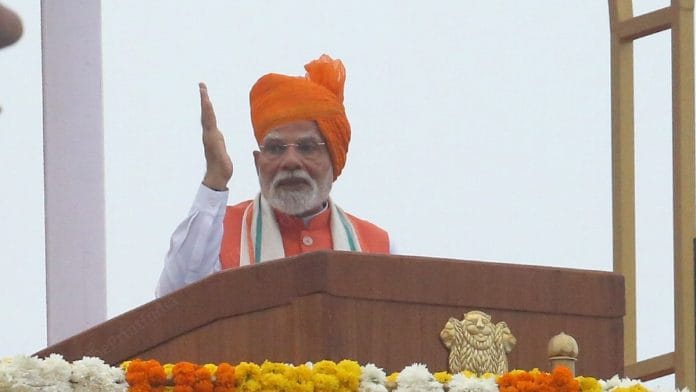New Delhi: Prime Minister Narendra Modi Friday hit out at the Indus Waters Treaty (IWT), calling the agreement “one-sided” and causing “unimaginable damage” to Indian farmers, asserting that the “right to water belongs to India and its farmers”. He also said, “India has decided that blood and water will not flow together.”
“Now the countrymen have come to know very well how unjust the Indus Waters Treaty is, how one-sided it is. The water of the rivers originating from India is irrigating the fields of the enemies while the soil of my country, the farmers of my country are thirsting for water,” Modi said in his Independence Day address from the ramparts of the Red Fort.
Modi added: “What kind of agreement was it? It has caused unimaginable damage to the farmers of my country for the last seven decades. The waters that belong to India will be used by India, for India’s farmers alone and we will no longer tolerate an arrangement that deprives its farmers. In the interest of farmers, in the interest of the nation, we do not accept this agreement.”
The comments by the Prime Minister come after Pakistani leadership in recent days have upped the ante over the flow of the Indus waters, threatening to attack India if even a drop is withheld. Pakistani army chief Asim Munir, went so far as to proclaim that Islamabad was willing to take down half the world along with India with its nuclear weapons, if the country is faced with an existential crisis.
Munir made the comments at a black-tie dinner in the city of Tampa last week, while he was in the US for a function, as reported exclusively by ThePrint. Days later, Prime Minister Shehbaz Sharif, and former foreign minister Bilawal Bhutto Zardari joined the chorus against India, promising to “teach” New Delhi a lesson if the flow of the Indus waters are affected.
Days after the terrorist attack in Jammu and Kashmir’s Pahalgam, that left 26 people dead, India issued a raft of punitive diplomatic measures against Pakistan, including holding the IWT in abeyance. The agreement signed in 1960, survived the wars of 1965 and 1971, and the Kargil conflict 1999.
Also read: India can keep the Indus Waters Treaty ‘in abeyance’, unilaterally. Here’s why
‘New normal’
India has at multiple times declared that the treaty will remain in “abeyance” until Pakistan withdraws its support for cross-border terrorism. Tensions between the two neighbours have been high since the 87-hour conflict in May. India launched Operation Sindoor, targeting terrorist complexes across Pakistan, including Jaish-e-Mohammad’s headquarters at Bahawalpur and the facilities of the Lashkar-e-Taiba in Muridke.
New Delhi’s strikes were in response to the Pahalgam terrorist attack. The Indian Prime Minister Friday reiterated that no longer will terrorists be differentiated from the government of the state supporting them.
“We will give a befitting reply”, declared Modi from the Red Fort, asserting that the Indian Army “on its own terms” will hit targets carrying out terrorist attacks from across the border. While India had been focused on degrading terrorist infrastructure during Operation Sindoor, Islamabad escalated the conflict by targeting New Delhi’s military infrastructure.
Eventually after 87 hours, both countries arrived at a bilateral understanding to pause hostilities. However, Modi has made clear that Operation Sindoor is not finished, and that the paradigm to deal with terrorist attacks has changed.
“Our country has been bearing terrorism for many decades. The chest of the country has been pierced. Now we have established a new normal, we will no longer consider terrorism and those who nurture terrorists, those who give strength to terrorists, as different,” said Modi Friday.
India, Thursday rejected the award announced by the Permanent Court of Arbitration in the Hague, with regards to the IWT.
“India has never accepted the legality, legitimacy, or competence of the so-called Court of Arbitration. Its pronouncements are, therefore, without jurisdiction, devoid of legal standing, and have no bearing on India’s rights of utilisation of waters,” Randhir Jaiswal, the official spokesperson for the Ministry of External Affairs, said Thursday at a regular press briefing.
Jaiswal added: “As reiterated in our press release of 27 June 2025, the Indus Waters Treaty stands in abeyance by a sovereign decision of the Government of India, taken in response to Pakistan’s continued sponsorship of cross-border terrorism, including the barbaric Pahalgam attack.”
(Edited by Viny Mishra)
Also read: Ending Indus treaty may hurt Pakistan’s poor, but it’ll also unite it with anti-India hatred






